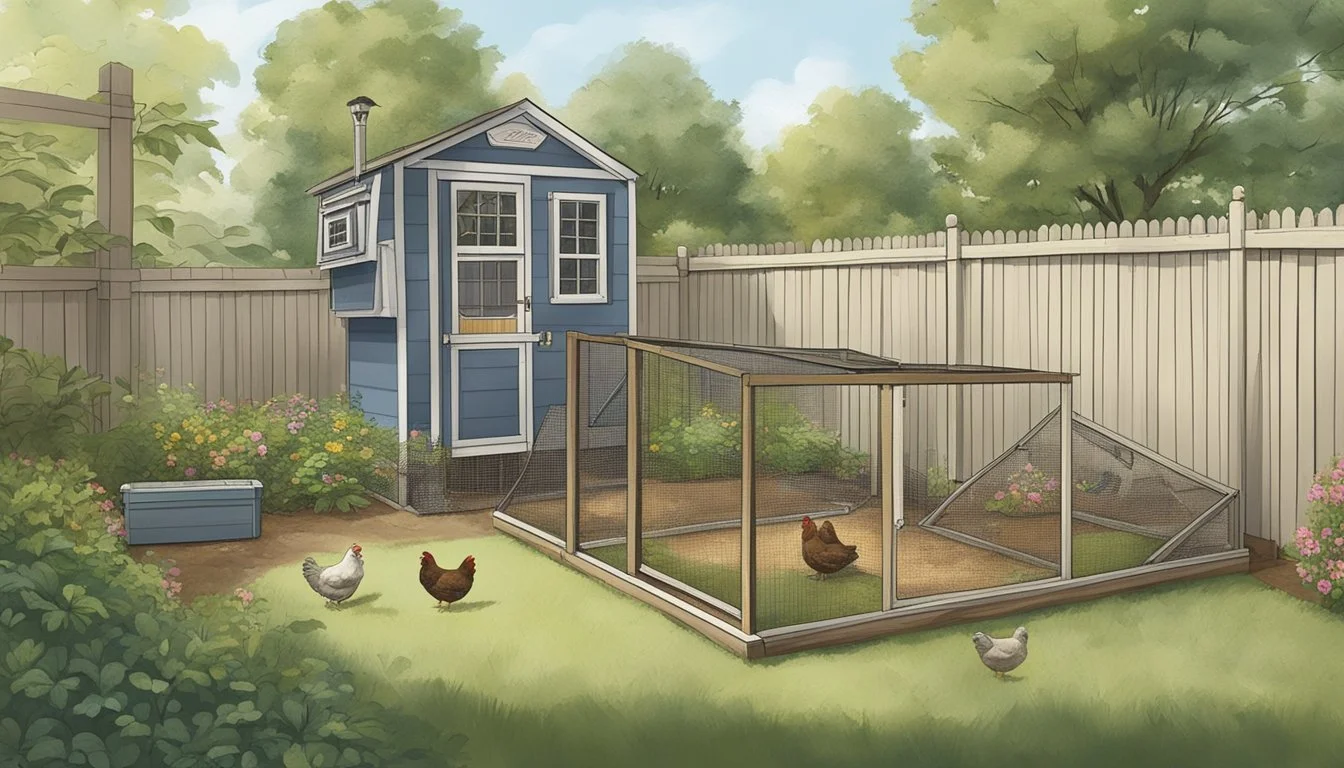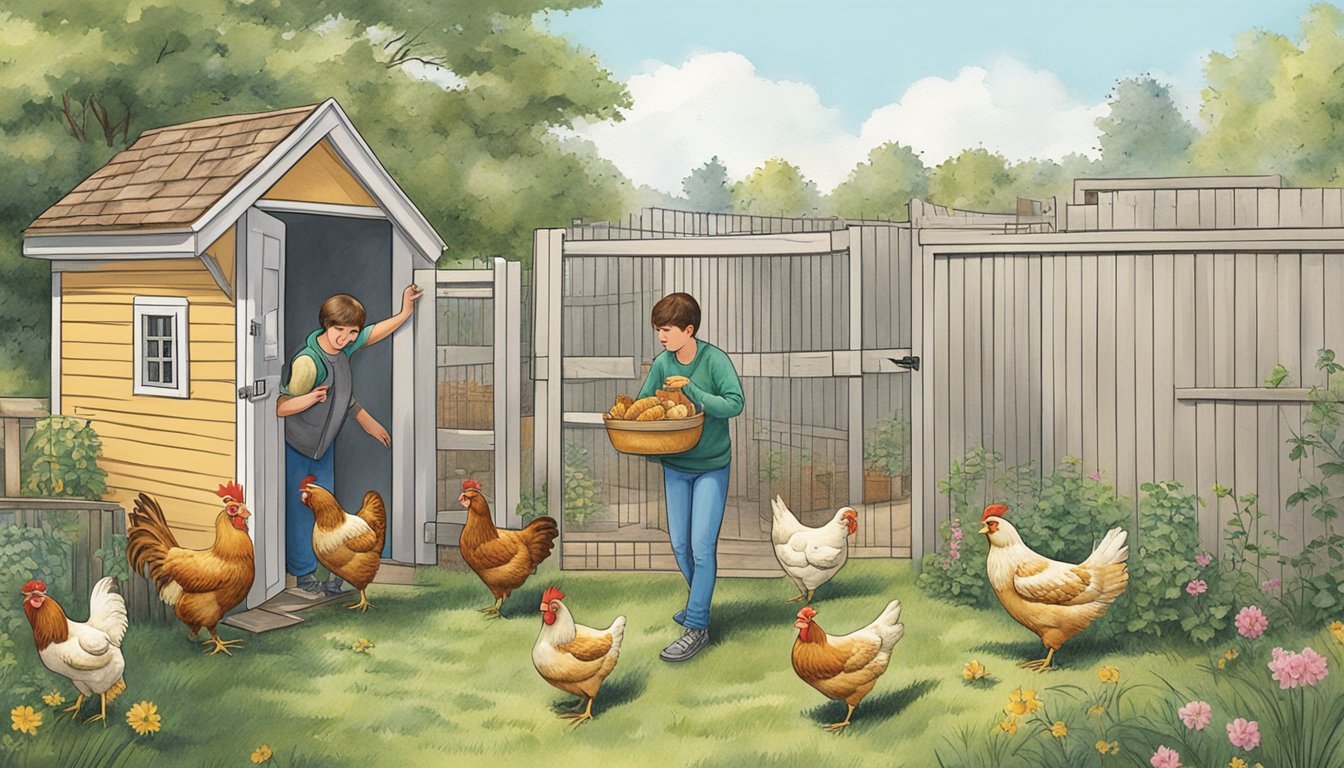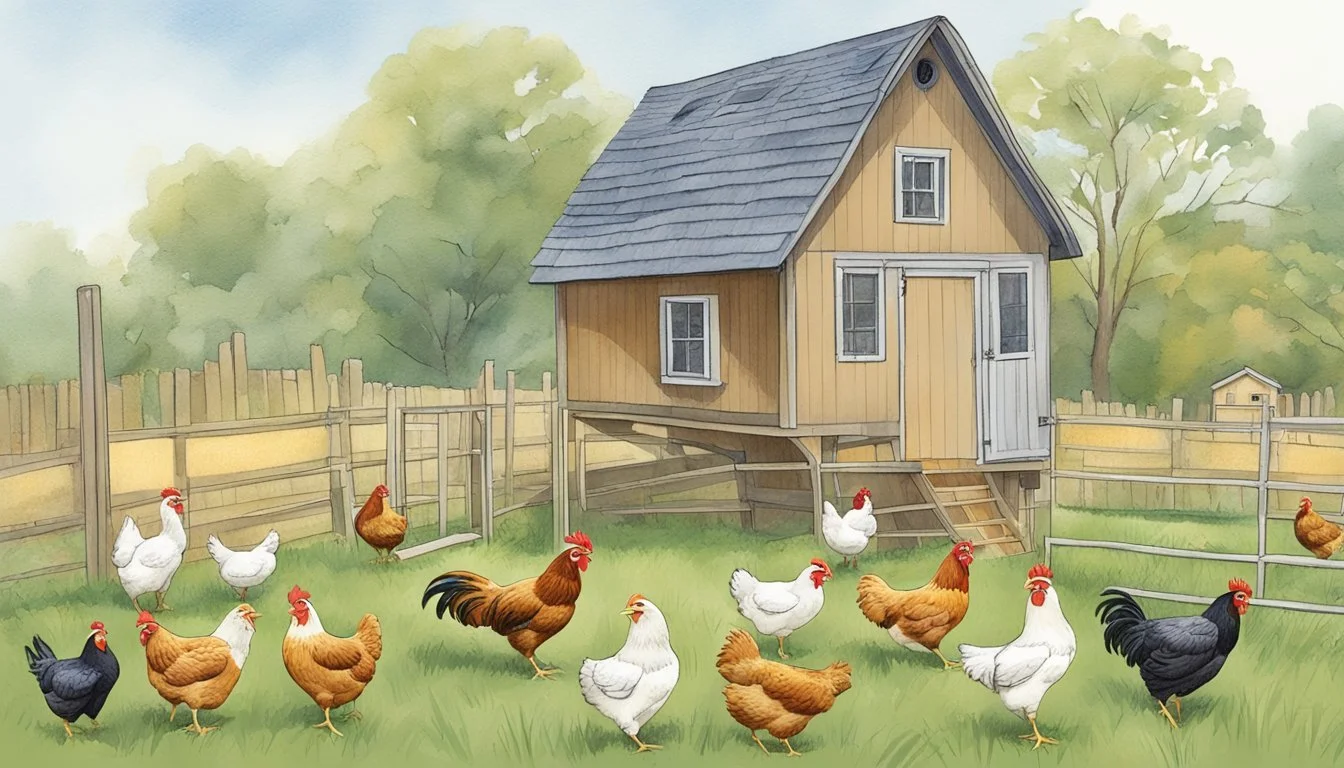Keeping Backyard Chickens in Quincy, MA
Essential Tips and Regulations
Residents of Quincy, Massachusetts, have the opportunity to engage in the increasingly popular activity of raising backyard chickens. This trend offers the benefits of fresh eggs, natural garden pest control, and the enjoyment of chicken-keeping as a hobby. Quincy's local regulations allow residents to keep a defined number of chickens, ensuring that individuals can enjoy this practice while maintaining harmony within the community.
Understanding the local laws is crucial for anyone considering backyard chickens in Quincy. The city permits the keeping of 3 to 5 chickens on residential properties, with clear stipulations to prevent any nuisance to neighbors. Coops are required to be at least 6 feet from any property lines. While no permit is required to keep chickens, the key is to ensure that their upkeep does not disturb others with noise, odor, or related concerns.
Importantly, while the city allows for the keeping of chickens, roosters are subject to stricter nuisance rules due to their potential noise. Those interested in raising backyard chickens should also familiarize themselves with any additional specific town bylaws and regulations pertinent to their area in Quincy to fully comply with municipal standards and to be considerate of their community.
Understanding Local Ordinances
When considering raising backyard chickens in Quincy, MA, it is crucial to be aware of the specific local and state ordinances that apply. Ensuring compliance with these rules can help avoid legal issues and maintain good standing within the community.
Massachusetts State Laws
Massachusetts law outlines several key regulations that affect the keeping of backyard poultry. MGL c.272, § 94 states that causing discomfort or injury to any domesticated animal is prohibited, reflecting the state's concern for animal welfare. Additionally, MGL c.272, § 95 penalizes the disturbance of domestic fowl. The 330 CMR 35.00, regulations implementing the Act to Prevent Cruelty to Farm Animals, sets forth standards for the proper care and housing of farm animals, including chickens. Residents must adhere to these laws as a baseline for keeping poultry.
Quincy City Regulations
Quincy's local city regulations stipulate that residents can keep 3 to 5 chickens on residential properties. While roosters are allowed, they must not create nuisance noise, as strict rules are enforced to maintain neighborhood tranquility. The local government in Quincy requires that chicken coops be located a minimum of 6 feet from property lines. These bylaws are designed not only for the welfare of the chickens but also to address potential concerns from neighbors regarding space and noise.
Permit Requirements for Quincy
In addition to understanding the statewide laws and Quincy's city regulations, potential poultry keepers must familiarize themselves with the local permit process. The city may require residents to obtain a license or permit from the Quincy Health Department or Board of Health to legally keep chickens within city limits. Failure to comply with these permit requirements could result in fines or other penalties. It is recommended that residents contact the city's Health Department for the most current information regarding necessary permits and any associated fees.
Selecting Your Chickens
When choosing backyard chickens in Quincy, MA, residents must consider the local climate, available space, and their egg-laying expectations. Breed selection and the decision to buy chicks or hatch eggs are critical first steps.
Breed Considerations
In Quincy, MA, one should select chicken breeds that can withstand the cold New England winters. Hardy breeds like the Plymouth Rock and the Rhode Island Red thrive in colder climates due to their robust nature. It's advisable to prioritize breeds known for their docility if the household has children or pets, as breeds such as the Silkie or the Buff Orpington are known for their gentle temperaments.
For those focused on egg production, Leghorns and Sussex chickens are excellent layers. Those with limited space might consider Bantams, which are smaller in size. When selecting breeds, also consider noise levels, especially if keeping roosters is part of the plan, as this may impact neighborhood relations due to Quincy's strict nuisance rules.
Buying Chicks or Hatching Eggs
Residents have two options when starting their backyard flock: buying chicks or hatching eggs. Purchasing chicks from a reputable hatchery or feed store can be more straightforward for beginners, as it allows for a more predictable outcome in terms of the number of hens versus roosters and the health of the birds.
Hatching eggs, meanwhile, involves sourcing fertilized eggs either locally or through online hatcheries. This method provides an educational opportunity to observe the life cycle of chickens but comes with variables like hatch rates and the sex of the chickens. Hatching requires an incubator and a closely monitored environment to ensure a successful hatch.
Whether buying chicks or hatching eggs, always ensure that the source is credible and adheres to the best standards for health and breed accuracy.
Creating a Suitable Habitat
Creating a suitable habitat for backyard chickens is essential to their wellbeing. It involves designing a secure and spacious coop, considering proper placement within property boundaries, and fortifying against potential predators.
Designing Your Chicken Coop
The chicken coop should be spacious enough to allow for natural behaviors. Each chicken requires at least 4 square feet of space inside the coop to ensure they are not cramped. Nesting boxes should be included to provide a quiet area for laying eggs, generally one box for every 3-4 hens. Inside the coop, roosts should be provided for sleeping, positioned higher than the nesting boxes to align with chickens' instinct to roost in high places.
Coop Placement and Property Lines
When positioning a chicken coop on a property, it is crucial to maintain adherence to zoning regulations which may dictate specific distances from property lines and neighboring dwellings. A typical requirement might be a 20- to 50-foot setback from property lines, ensuring that the coop does not infringe upon neighbors' space or local ordinances. Not only does this compliance respect neighborly boundaries, but it also helps mitigate noise and odor concerns.
Protecting Against Predators
Chickens can fall prey to a variety of predators such as foxes, raccoons, and birds of prey. To protect a coop from these threats:
Enclose the coop and run with secure fencing, extending it over the top and burying it at least 12 inches underground to prevent digging.
Utilize lockable doors and sturdy latches that cannot be manipulated by clever predators.
Consider the use of motion-sensor lights or noise machines to deter nocturnal visitors.
By focusing on these features, one can create a safe and comfortable environment for backyard chickens in Quincy, MA.
General Chicken Care
Caring for backyard chickens in Quincy, MA involves a dedicated approach to feeding, maintaining their health, and ensuring their habitat remains clean and secure. Effective management promotes the safety and wellbeing of the poultry.
Feeding and Nutrition
Chickens require a balanced diet rich in nutrients to thrive. They should have continuous access to fresh water and a poultry feed that meets their specific life stage requirements:
Chick Starter: High in protein, it supports growth for chicks up to 6 weeks old.
Grower Feed: Moderate protein content for chickens 6 to 20 weeks old.
Layer Feed: For egg-laying hens, rich in calcium to support shell production.
Offering a mix of grains, legumes, and greens can supplement their diet. Avoid adding salty or processed foods to their diet to maintain optimal health.
Health and Disease Prevention
Preventing disease is crucial for backyard poultry:
Vaccinations: Effective against common poultry diseases; consult a veterinarian.
Parasite Control: Regularly check for and treat any infestations.
Antibiotics: Use responsibly and only under veterinary supervision.
Maintaining clean living conditions minimizes infection risks. Remove waste regularly and compost appropriately.
Daily Maintenance
Chicken coops in Quincy, MA, should be well-ventilated, predator-proof, and cleaned often to prevent disease and odors:
Remove waste daily to prevent the buildup of ammonia and attractants for pests.
Inspect chickens regularly for any signs of disease or distress.
Providing a dust bath area can help chickens maintain their feather health and control parasites. Regularly check for waterfowl not to share diseases with chickens.
Eggs and Harvesting
When raising backyard chickens in Quincy, MA, understanding the process of egg collection and considering the purpose of harvesting—whether for egg consumption or meat production—is essential for any poultry keeper.
Collecting and Storing Eggs
One can expect hens to lay eggs almost daily, particularly in their first few years. Successful egg collection involves consistency; eggs should be collected at least once a day. Storage of fresh eggs is straightforward: they can be held at room temperature for several days, but for extended freshness, refrigeration is advisable. The Massachusetts climate necessitates that residents store eggs properly to prevent spoilage. Implementing a system for rotating eggs ensures that the older eggs are used first.
Egg Collection: Daily, preferably in the morning
Storage: Room temperature for a few days, refrigeration for longer freshness
Egg Rotation: Use older eggs first to maintain freshness
Planning for Meat or Sale
Residents who raise chickens for meat require a different approach. Chickens destined for consumption should be raised with attention to diet and space to ensure healthy growth. When chickens reach the appropriate age for harvesting—typically around six to eight weeks for broilers—they should be processed humanely in accordance with local regulations. Selling eggs or meat often involves compliance with additional state and local laws. In Quincy, MA, individuals should verify any permits or regulations related to the sale of poultry products.
For Meat: Broilers typically reach harvest age at 6-8 weeks
Legal Compliance: Check local regulations for the sale of meat or eggs
Laws and Community Engagement
When keeping backyard chickens in Quincy, MA, residents should be aware of specific local laws and the significance of engaging with their community. Both legal compliance and community relations play crucial roles in urban agriculture.
Understanding Livestock Ordinances
In Quincy, MA, individuals are permitted to keep chickens without the need for a special permit. The key regulations are straightforward:
Number of Chickens Allowed: Residents can have 3 to 5 chickens on residential properties.
Roosters: Allowed; however, nuisance rules are enforced to address noise concerns.
Coop Restrictions:
Coops must be at least 6 feet from property lines.
Good hygiene and waste disposal are required to prevent odors and pests.
It is imperative for chicken keepers to stay abreast of any updates to Massachusetts regulations and local livestock ordinances to ensure continued compliance.
Working with the Community
Engaging with neighbors and the community is vital for anyone involved in urban agriculture. Here are productive ways to maintain positive relations:
Communication: Inform neighbors about one’s chicken-keeping endeavors to address any concerns proactively.
Nuisance Management: Implementing measures to control noise and waste can mitigate complaints.
Education: Sharing information about the benefits of backyard chickens, such as organic pest control and fresh eggs, may improve community support.
Should residents require assistance with regulations, they can consult with local animal shelters or legal experts well-versed in urban agriculture laws. By combining adherence to regulations with considerate community engagement, backyard chicken enthusiasts contribute positively to Quincy's urban ecosystem.
Additional Considerations
When embarking on raising backyard chickens in Quincy, MA, residents should carefully consider the time and financial investment required, as well as the educational benefits and enjoyment they can provide.
Time and Financial Commitment
Raising chickens demands both a consistent time investment and financial resources. Prospective chicken keepers must plan for daily feeding, water replenishment, and coop cleaning to ensure a healthy environment. Financially, initial costs include the coop construction, which must adhere to local regulations of maintaining a six-foot distance from property lines, as well as expenses for feed, bedding, and veterinary care. A well-planned budget should also account for potential unforeseen costs associated with poultry care.
Daily Time Requirements:
Feeding and providing fresh water
Cleaning the coop and run
Checking for health issues and collecting eggs
Initial and Ongoing Costs:
Coop and run construction
Chicken feed and water dispensers
Bedding material
Routine and emergency veterinary care
Protective measures against predators
Educational and Fun Aspects
Backyard chickens can serve as an excellent educational resource, offering a hands-on learning experience about animal husbandry and the responsibility of caring for living creatures. Families, especially with school-aged children, may find the process of raising chickens to be an interactive way to learn about biology, agriculture, and the importance of sustainability.
Educational Benefits:
Understanding of lifecycle and animal care
Lessons in responsibility and routine
Insight into local agricultural practices
Keeping chickens can also be a rewarding and fun undertaking. Observing the unique behaviors and personalities of chickens provides entertainment and relaxation. Moreover, the joy of collecting fresh eggs and knowing one has contributed to their healthy upbringing can be a gratifying experience.
Enjoyable Aspects:
Connection with the animals
Fresh eggs as a sustainable food source
Participation in the local urban farming community
Resources and Assistance
When residents in Quincy, MA consider keeping backyard chickens, they benefit from a variety of local resources and online support systems that offer information and guidance. These resources help ensure that chicken keepers are well-informed about local regulations, best practices for poultry health, and community standards.
Local Resources
City Regulations: Individuals seeking specific information regarding chicken and rooster ownership in Quincy can refer to the city's official website or contact the local government office. The city allows residents to keep between 3 to 5 chickens without a permit, though coops must be at least 6 feet from any property lines and adherence to strict nuisance rules is expected.
Quincy Health Department: For questions about health standards and coop inspections, the Quincy Health Department is a reliable source.
Community Groups: Local community groups and poultry hobbyist clubs often share their expertise and may provide assistance to new chicken owners.
Online Information and Support
Websites:
Mass.gov also details across Massachusetts, including Quincy.
ChickenLaws.com offers a summary of laws for various cities, including Quincy, which is a practical start for legal compliance.
Support Forums:
Online forums like BackYard Chickens enable poultry enthusiasts in Quincy and surrounding areas like Boston, Lynn, Brockton, Fall River, New Bedford, and Somerville to connect and exchange insights.
Research:
Residents can perform in-depth research on best practices for keeping chickens through resources available at local libraries or through academic institutions in the region.
By engaging with both local and online resources, Quincy residents can confidently maintain backyard chicken coops that are compliant with local ordinances, respectful of their community, and supportive of the health and well-being of their poultry.









